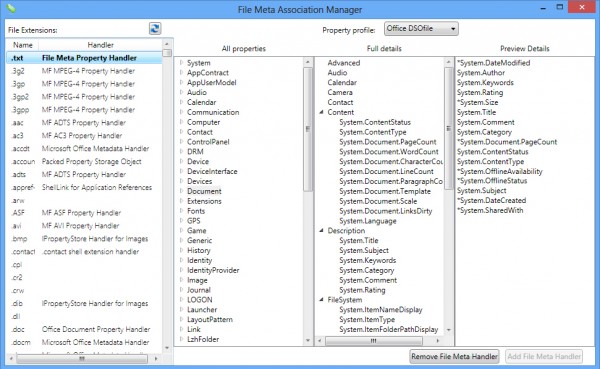File Metadata lets you view and edit metadata for all file types
 Windows Explorer has displayed file metadata for a very long time. Click an image, say, and you’ll see (and have the option to edit) details like the picture title, author, comments, camera manufacturer, model and more. This allows you to record useful extra information about each file, and is also used by Windows Search, so for instance searching for "Title:Fiji" would locate all files with "Fiji" in the title.
Windows Explorer has displayed file metadata for a very long time. Click an image, say, and you’ll see (and have the option to edit) details like the picture title, author, comments, camera manufacturer, model and more. This allows you to record useful extra information about each file, and is also used by Windows Search, so for instance searching for "Title:Fiji" would locate all files with "Fiji" in the title.
Ever since Windows Vista, though, general metadata support has been restricted to only file types which include metadata within the files themselves -- images, MP3′s, Office documents and so on -- while simpler formats, like TXT or HTML, are left out. Annoying? Yes. Restrictive? Absolutely. But it doesn’t have to be this way. Grab a copy of the File Metadata beta and you’ll be able to create, view and edit metadata for just any file type you like.
Once installed, you have to turn on metadata for new file types individually via the program’s File Association Manager. This looks horrific, with long lists of possible properties and their various details, and will probably scare off many potential users immediately. But don’t panic, it’s not as bad as it seems.
If you want to add metadata support for text files, say, then all you have to do is scroll the left-hand "File Extensions" list, select the TXT file type, and click "Add File Meta Handler". Clicking a TXT file in Explorer should immediately display metadata for that file (if not, make sure the Explorer Details pane is displayed), and you’ll be able to add a title, comments, category, subject and more (if you get an error message, restart your PC and try again).
Once you get past the intimidating File Association Manager and realize how simple it is, File Metadata works just fine, and is a great way to help classify and locate your files.
But beware, one reason Microsoft dropped this feature from Windows Vista is that your metadata can be "lost". The tags are stored as NTFS properties, and so remain intact if you copy them between NTFS volumes, but disappear if, say, you move your files to a FAT-based file system, or email them to someone.
 Add the fact that File Metadata is a beta, and the program is best treated with caution. While it ran without problems for us, we would recommend you only try it on PCs where you’ve a full system backup available. And be sure to test the program carefully to make sure it works exactly as you’d expect.
Add the fact that File Metadata is a beta, and the program is best treated with caution. While it ran without problems for us, we would recommend you only try it on PCs where you’ve a full system backup available. And be sure to test the program carefully to make sure it works exactly as you’d expect.
Photo Credit: Stuart Miles/Shutterstock